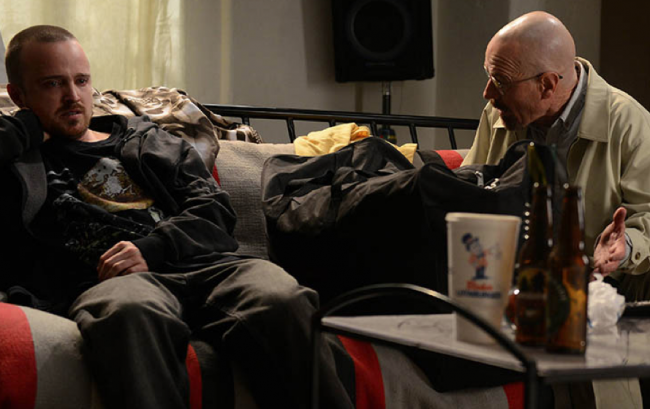
"Breaking Bad's" epic five-season journey came to a close last night with a "satisfying end." And while fans are struggling to break up with "Breaking Bad," they are beginning to wonder just what was so addicting about the stressful, meth-induced series anyway? AMC's hit show was not only an emotional taxing ride for the characters but also the audience who enduring each gut-wrenching episode with them. So if at the end of the finale "Felina," you broke out into a rendition of "Hurts So Good," you are not alone. "Breaking Bad" is defined as TV so good that it hurts, but what is it about that pleasure and pain that keeps us coming back?
And while I would love to say, we tuned in due to Jesse's perpetual yelling of "b*tch!" It's not, well not totally, Dolf Zillmann an expert in entertainment psychology believes that the reason we love to watch "Breaking Bad" comes from the emotional intensity that the show makes us feel. The reason we love "Breaking Bad" revolves around his excitation transfer theory, which states that throughout viewing the audience experiences a wide range of emotions, and that all the excitement from each of those emotions builds up while we watch.
This stressful excitement and edge of your seat feeling is obviously not the pleasurable aspect of viewing, but according to Zillman's excitation transfer theory, all that anxious intensity carry overs to boost positive emotions like relief or happiness once the episode ends. Meaning that the happy ending is even more satisfying when we endure a rollercoaster of emotions before. Zillman's theory doesn't stop there; the way an audience feels towards the specific characters in a show affects our emotional response. According to his affective disposition theory, viewers enjoy when the "good guys" win and "bad guys" lose.
But this is when Zillman's theory gets a bit tricky for "Breaking Bad." The show where the good guys are the bad guys and bad guys are even worse. So with antihero protagonists and not so reassuring endings, why is it that so many people, 6.4 million to be exact, subject themselves to emotionally exhausting episodes? Communication scholars have some new theories that attempt to explain this phenomenon. Some research states that we enjoy watching stressful and negative shows to make use feel better about our own emotionally difficult situations. As for "Breaking Bad" when we watch the deterioration of Skylar and Walt's marriage, perhaps we feel better about our own relationships.
But while we may not have realized this is not a new theory. The idea of relating our personal lives to the plot of our favorite dramas was first purposed by Aristotle in the "Poetics." Hard-to-watch shows, like "Breaking Bad" provides audiences with a cathartic experience, which allows viewers to partake in an emotional purification through pity and fear as shown in entertainment. It feels good for viewers to feel for the characters, like Walt, as the watch them journey through life and confront death. By allowing viewers to laugh, cry and suffer, they go through a change in emotion that results in renewal and restoration.
Moreover, despite the excruciating viewing experience, "Breaking Bad" actually provides us with positive emotions. Aristotle was the first to propose this idea within comedy and tragedy, but Mary Beth Oliver, a professor of media studies at Penn State, has brought this idea into modern TV times. Oliver has identified several eudemonic emotions that occur after watching depressing, stressful, and even horrifying television. She states that eudemonia is a sensation that connects us with our own humanity; meaning that "Breaking Bad" has the ability to leave us feeling fulfilled, and even teaches us something about ourselves.
RELATED:
'American Horror Story: Coven' Season 3 Spoilers: The True Story Behind Kathy Bates Character Madam Delphine LaLaurie [VIDEO]
Fall TV Shows 2013: Top 10 Shows To Watch And 10 You'll Want To Skip [PHOTOS]
'Need For Speed' Movie Trailer 2014: Watch 'Breaking Bad' Star Aaron Paul In Explosion-Filled High-Speed Chase! [VIDEO]
© 2025 Latin Times. All rights reserved. Do not reproduce without permission.





